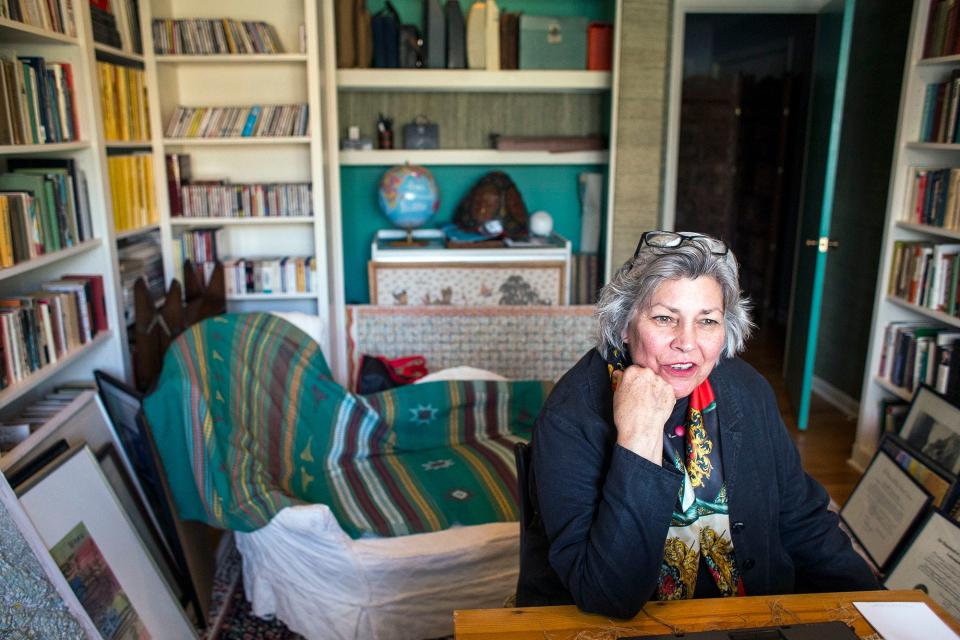Opinion: Preparing for nation’s 250th, let’s celebrate basic bonds of shared citizenship
- Oops!Something went wrong.Please try again later.
- Oops!Something went wrong.Please try again later.
It’s not too soon to start planning our nation’s 250th anniversary. Yes, even in this time of great division, we can celebrate together. More than geography and history, beyond family, gender, race, ethnicity, status, class or political differences, civic rituals celebrating shared national values serve to keep a complex, diverse nation together in spite of fissures in unending cycles of conflict.
In the 1990s, while at Shenandoah University teaching mass communications, for each U.S. Presidential Inauguration Day in that decade — Jan. 20, 1993 and 1997, I announced that our classes would not be held on campus in Winchester, Virginia. Instead, to students’ surprise and some initial pushback, I encouraged them to go to nearby Washington, D.C., to watch and experience the inaugural ceremony and parade in person on streets or TVs on the National Mall or in restaurants.
That decade the newly elected, then reelected, president was a Democrat. Some students complained they saw no reason to go because they were not of that party. I explained how an inauguration in our democracy is a ritual of American citizenship, whether watching on TV or in person, regardless of our political leanings. I described moving experiences I had in the past standing in crowds to see two inaugurations — President Jimmy Carter, Democrat, and President George H.W. Bush, Republican, as well as watching all other televised inaugurations since President Eisenhower. Most all my students went to the nation’s capital city to experience citizen celebrations. Later, most all expressed appreciation.
How can we again come together in such uniting, binding “E Pluribus Unum” (“from many-one”) moments in an ever-divergent nation? As anthropologists, we look for these moments — sociocultural rituals — for momentary bonding of members in any society, small or large, all almost always in some continuous conflicts.
On July 4, 1976, across the United States, we celebrated the bicentennial — 200th anniversary of our nation’s founding. It was not perfect, but was momentarily uniting and uplifting. What was the state of the nation on that occasion? American citizens had for years been radically divided. It was another election year. In recent memory, one president, the nation’s civil rights leader and another national leader had been assassinated, and another president pushed to resign by exposure of his crimes and later pardoned by his successor then running for reelection in 1976.
More: Opinion: Asheville 20-year-old sees hope after Roe v. Wade overturn with 2024 election
Only a year before in 1975 had the U.S. finally pulled its military out of a war that had split our country at home. In 1976 citizens were pitted over issues of civil rights, women’s liberation, environmental movement, socio-cultural-sexual revolution radically changing traditional mores, basic politics. American cities had burned, students gunned down by National Guard soldiers, families split politically. Generations were battling, racial and ethnic clashes continuing, women versus men in angry disagreements, rich and poor against each other, homeless populations increasing again, educated and less educated in stark divisions, powerful elites ignoring the rest of the population, political parties radically opposed.
Still, bicentennial planning and celebrations went forward throughout 1976 culminating in the great national and local celebrations of July 4 holiday. Everyone seemed to feel relief and even united on that day. The bicentennial of 1976 was one of those binding moments bringing us together in our divergent nation. Some would say divisions in our nation are worse now. I’m not so sure. I believe we can celebrate together in 2026 the 250th anniversary of our nation’s birth.
Even this summer we have signs of national efforts for promoting unity and citizens-bonding moments. Here in Western North Carolina, N.C.’s youngest Mayor Preston Blakely leads fellow residents in celebrating unifying moments for their town of Fletcher, full of diversity of people and political opinions. Katherine Bauer, 20, Asheville resident and Boston University student, authored a Citizen Times op-ed urging civic involvement for her generation and all citizens.
More: Editor: Open call for women to share their voices, during Women's History Month and always
Let us all now work together despite our ever-present divisions to prepare national celebration and thanksgiving at our nation’s Semiquincentennial — 250th anniversary of the 1776 U.S. Declaration of Independence. Let us look forward from all political positions to celebrating together our shared citizenship on July 4, 2026. As a nation, we need to have, honor and celebrate such binding moments to unite us all.

Elizabeth (Liz) Colton is a UNITAR global professor of diplomacy & the media, also Diplomat & Journalist in Residence at Warren Wilson College. She holds a Ph.D. in social anthropology from the University of London School of Economics & Political Science. (This op-ed developed from a paper she presented at The Pen and Plate Club of Asheville in July.)
This article originally appeared on Asheville Citizen Times: Opinion: Preparing for America's 250th anniversary can help US bond

